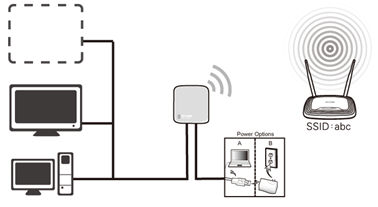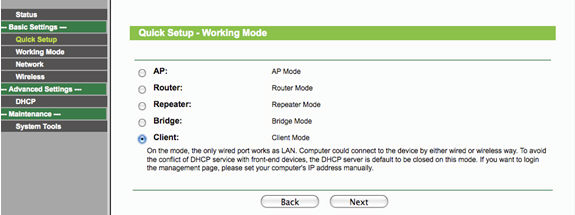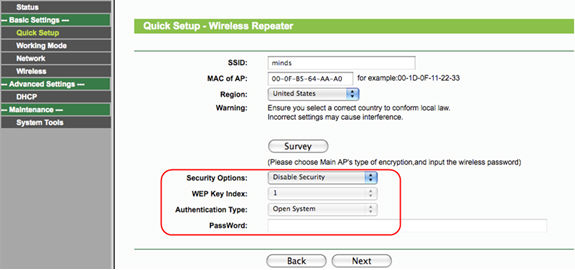How to Configure Client Mode on TL-WR702N
This Article Applies to:
Note: This FAQ is only suitable for TL-WR702N with firmware version 130314 or older; it is NOT suitable for 130528 or later version.

Definition: The TL-WR702N is connected to another device via Ethernet core and acts as an adaptor to send/receive the wireless signal from your wireless network.
Application: For a Smart TV, Media Player, or game console with an Ethernet port. Use the 702N to make your devices Wi-Fi enabled, granting them access to your wireless network.
Physical Connection
Step 1:
Connect the WR702N directly to your computer’s Ethernet port by an Ethernet cable;
Step 2:
Power on the WR702N
.jpg)
Initial Computer Setup – For Windows 7, Vista & XP (For Mac OS X, please go to page 3)
Step 1:
Windows 7 & Windows Vista: Go to Start -> Control Panel -> Network and Sharing Center
Windows XP: Go to Start -> Control Panel -> Network Connections
.png)
Step 2:
Windows 7: Go to Network and Sharing Center -> Change Adapter settings
Windows Vista: Go to Network and Sharing Center -> Manage Network Connections
Windows XP: (Go to Next Step)
.png)
Step 3:
Windows 7, Vista and XP: Right Click Local Area Connection ->Select Properties > Double Click Internet Protocol Version 4 (TCP/IPv4) or Internet Protocol (TCP/IP) forWindows XP.
.png)
Step 4:
Windows 7, Vista and XP: Select “Use the Following IP address:”
Type the following information:
1. IP address: 192.168.0.10
2. Subnet mask: 255.255.255.0
Click OK to exit
Click OK again to apply the settings.
.png) Windows 7, Vista & XP
|
Initial Computer Setup – For Mac OS X
Go to the Apple -> System Preferences -> Network -> Highlight Ethernet -> Configure IPv4: Using DHCP with manual address
Input the IPv4 Address: 192.168.0.10
Click Apply
.jpg)
Access the Management Page
Open a Web Browser > Type 192.168.0.254 in the address bar -> Press Enter
.jpg)
Enter the default User Name: admin
Enter the default Password: admin
Click OK
.jpg)
Run Quick Setup
Step 1:
Go to Quick Setup -> Click Next
.jpg)
Step 2:
Select Client -> Click Next

Step 3:
Click Survey
.png)
Locate your router network name under the SSID column -> Click Connect

Security Options: (Please match Security Options with your existing router)
Please refer to Original Equipment Manufacturer for details
Password: (Please match Security Password with your existing router)
Step 4:
Click: Next

Step 5:
Click Reboot, and wait until it goes to 100%
.jpg)
Relocate the WR702N
You may now connect the WR702N directly into your Media Device, Game Console, Smart TV, Desktop Computer, or other devices that utilize an Ethernet port.
Congratulations! Your wired device is Wi-Fi enabled. It can connect to your wireless network without the Ethernet core.

Final Computer Reversion – For Windows 7, Vista & XP (For Mac OS X, please go to page 8)
Step 1:
Windows 7 & Windows Vista: Go to Start -> Control Panel -> Network and Sharing Center
Windows XP: Go to Start -> Control Panel -> Network Connections
.png)
Step 2:
Windows 7: Go to Network and Sharing Center > Change Adapter settings
Windows Vista: Go to Network and Sharing Center > Manage Network Connections
Windows XP: (Go to Next Step)
.png)
Step 3:
Windows 7, Vista and XP: Right Click Local Area Connection ->Select Properties -> Double Click Internet Protocol Version 4 (TCP/IPv4) or Internet Protocol (TCP/IP) forWindows XP.
.png)
Step 4:
Windows 7, Vista and XP: Select “Obtain an IP address automatically” and “Obtain DNS server address automatically”
Click OK to exit
Click OK again to apply the settings.
 Windows 7, Vista & XP
|
Final Computer Reversion – For Mac OS X
Go to the Apple -> System Preferences -> Network -> Highlight Ethernet -> Configure IPv4: Using DHCP
Click Apply
.jpg)
If it doesn't work, please feel free to contact us(support@tp-link.com).
Get to know more details of each function and configuration please go to Download Center to download the manual of your product.
Is this faq useful?
Your feedback helps improve this site.
TP-Link Community
Still need help? Search for answers, ask questions, and get help from TP-Link experts and other users around the world.